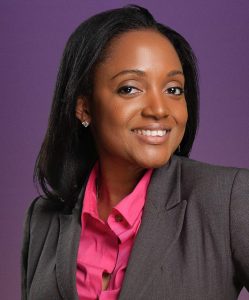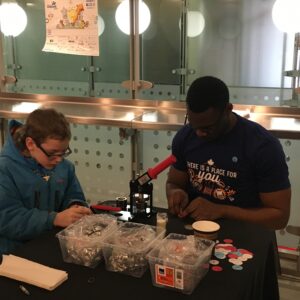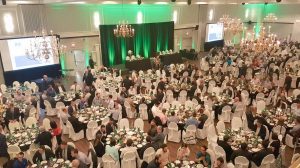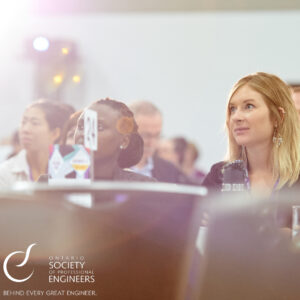Today is International Women’s Day 2021 – a global day of recognition celebrating the social, economic, cultural and political achievements of women and girls, and raising awareness of the work left to be done. This year’s theme in Canada is #FeministRecovery, highlighting the toll the COVID-19 pandemic has had on women specifically, and how to advance gender equality and provide economic and social stability for all Canadians. (The international theme is #ChoosetoChallenge).
On #IWD2021, OSPE is featuring three inspirational women, engineers and leaders – Jean Boudreau, P.Eng., President of Engineers Canada, Marisa Sterling, P.Eng., President of Professional Engineers Ontario, and Réjeanne Aimey, P.Eng., President and chair of the Ontario Society of Professional Engineers – who #ChoosetoChallenge the engineering profession to become more equitable, diverse and inclusive. We chatted with them about how their terms were affected by COVID-19 and what their biggest accomplishments were.
Jean Boudreau, P.Eng.
President, Engineers Canada
What has surprised you the most during your term as President?

The changes that the pandemic has brought to the way that all organizations do business have certainly been a surprise. Serving as President of a national association during a global pandemic that has limited the amount of travel and in-person meetings that we can do is certainly not something I expected when I put my name forward in 2019 to be considered for the position of President. I have had to lead a Board and work collaboratively with colleagues across the country while largely only being able to meet virtually. But, challenges and change are part of the job in engineering; whether they’re learning new skills to expand your technical expertise, adapting to new technologies, or learning to do things differently, we’ve all adapted over the past year and learned new ways of working together to advance the engineering profession.
The other thing that has surprised me is how many times the President of Engineers Canada is asked to participate in special events. The pandemic actually may be a bit of a blessing in disguise here because, since travel is not involved, it’s much easier to participate in more activities. I don’t have to decline invitations because I’m already booked to be somewhere else, and I’m able to participate in more events and make important connections across Canada.
What was your proudest accomplishment at Engineers Canada?
Despite the challenges brought on by the pandemic, Engineers Canada is functioning well in doing their routine work and we are also working hard to prepare a new strategic plan for 2022-2024 that addresses the priorities of our provincial and territorial members. I’m proud that through the upheaval of the past year, we’ve still been able to continue our work, consult with our members, and develop a strategic plan that I think puts forth a great way forward for the organization in the coming years.
I’m sure every President says they had the best Board working with them but, having sat in on almost all committee meetings as an ex-officio, I am very proud of how engaged and hard-working our Board is behind the scenes. Then, when we come to full Board meetings, all the preparation work by the committees and staff has been reviewed by the Board members and our full Board meetings are very productive and efficient.
What is one thing you think individual engineers should do to benefit the engineering profession as a whole?
I think that as individual engineers, we all need to realize that we have an obligation to support diversity, equity, and inclusivity in the workplace. There are a lot of great initiatives out there at all levels, whether at universities, at companies, in associations, or in NGOs. But individual engineers also need to reflect and recognize the role that each of us play in addressing discrimination in the workplace. We all have a role to play in creating inclusive environments and cultures. Increasing the diversity of the profession will produce nothing but benefits, and it will ensure that our profession reflects the diversity of the public that we are duty-bound to serve. It will support innovation and ensure the profession is looking at a diversity of perspectives in designing engineering solutions to best serve and protect the Canadian public. Today, International Women’s Day and its theme of #ChoosetoChallenge, is a great opportunity to consider how each one of us can challenge inequality, call out bias, question stereotypes, and promote diversity, equity, and inclusion in our workplaces and communities.
What is your “silver lining” from the past year of lockdowns?
I tend to be a “glass half full” kind of person so there have been a few things this year that could be considered as a “silver lining” for me. Like I said earlier, there have been very few times that I’ve had to decline an invitation to participate in a committee meeting, a regulator’s annual meeting or awards presentation, an annual conference or a special event all because I can participate virtually instead of booking a flight and hotel and spending a lot of time in transit. I also switched to part-time work with my employer to have the time to dedicate to my work as President of Engineers Canada. This has allowed me to transition away from the work force and I can honestly say that I am ready to move to full retirement mode.
But one of the most surprising benefits has been that my husband finally agreed to go forward with what started out as sprucing up the kitchen cupboards but expanded to a completely new layout for our kitchen and back entry to make it easier to have children, grandchildren, and extended family come visit (when government restrictions allow) and enjoy time and a meal together. Better yet is that he is as happy with the results as I am!

Marisa Sterling, P.Eng.
President, Professional Engineers Ontario
What has surprised you the most during your term as President?
The first and most obvious surprise was the pandemic, its duration, and the extent of the impacts to everyone. However, what has not surprised me this year has been the resiliency and determination of the human soul. My presidential installation was delayed one month so PEO could pivot to a virtual annual general meeting in May 2020. I did miss the chance to be surrounded by my family and friends who had planned to travel to Ottawa to join me for this event. There was a period of loss that I felt. But then I saw the opportunity to reimagine the PEO presidency. I taught myself how to set-up a home studio with lighting, audio and video that would professionally capture my first speech as President. I witnessed the commitment of PEO’s management and volunteers to embrace new ways of working so that PEO continued to focus on its protection of the public interest. We delivered a virtual volunteer leadership conference in June that set the standard for future PEO events. And I created a new way for Councillors to regularly and virtually dialogue on important topics through monthly Strategic Conversation sessions.
What was your proudest accomplishment at PEO?
I am proud of my many accomplishments at PEO over the years, as I have been involved as a staff member to a vice president to a president. For example, my reorganization of the enforcement department a few years ago helped to advance PEO’s work to both proactively and reactively stop unlicensed practice and misuse of the engineer title. As President this year, I am most proud of how hard I have worked to bring the Council, management and volunteers together, virtually, towards one clear vision. I have consistently talked about PEO’s north star this past year, which is its mandate to protect public wellbeing. Keeping the public at the forefront of PEO’s work has led the Council to make significant decisions this year that will positively direct the work of PEO for years to come. They include making PEO’s processes and meetings more accessible to everyone across the province using online and digital tools; initiating a process to evaluate and take action on any incidences of discrimination, bias or racism in PEO’s processes; and restructuring committees to refocus council’s attention to setting direction and control on regulatory and governance risks, while giving more opportunities for engineers and volunteers to support this work in operational committees. I am looking forward to continuing this work as Past President, supporting incoming President Christian Bellini and helping PEO gain more clarity on what it really means to be a modern regulator.
What is one thing you think individual engineers should do to benefit the engineering profession as a whole?
My answer is to lead with humility and inquiry. We need to continually question the status quo. Change is our only constant. We have been witnessing the rapid evolution of technology, the significant change in our climate and the fragility of our health systems. It is not enough to simply keep up with the change but instead as engineers we need to help lead the path forward while keeping the public interest paramount. And I believe we need to lead by asking questions and working together with others. Engineers have a unique positionality in society as licensed professionals. This means that in addition to being competent in our work, we have a duty to consider the intended and unintended consequences to citizens. The more often that engineers can engage with the public, understand the needs of communities, work with communities to co-develop solutions and educate their employers and the public on risks and opportunities, we will demonstrate the value of engineers and the engineering profession to society.
What is your “silver lining” from the past year of lockdowns?
The past year of lockdowns has reminded me of the importance of staying connected to one another. The pandemic has shown how artificial our borders are when a virus and inequalities can transcend them. It has made me question the silos that I live and work in and the securities that I assumed would always be there. It has reminded me to keep reaching out to others, even when it is awkward or unfamiliar, to understand a new perspective. Newton’s 3rd law of physics taught us that for every action there is an equal and opposite reaction. This past year I have become more present in my interactions with others which has brought about more positivity: I have initiated regular calls with family and friends to offer support to each other, I have been there for a friend experiencing partner assault at home, and I have been able to enrich my relationships with engineer and University of Toronto colleagues. I believe we can all learn much from the African proverb, “If you want to go fast, go alone. If you want to go far, go together.”
Réjeanne Aimey, P.Eng.
President and Chair, Ontario Society of Professional Engineers

What has surprised you the most during your term as President?
Two things surprised me and interestingly enough, they are both related to equity, diversity, and inclusion.
First, that the President role of the three organizations that influence the engineering profession in Ontario were all headed up by women. This was not on my radar and is something that our entire profession should be proud of as these decisions would have been made well in advance of the world waking up in 2020. It shows that our profession, that has traditionally been heavily male-dominated, was open to giving women who showed interest and were able and available to serve, a voice. Perhaps this is the result of the work of Engineers Canada’s 30 x 30 initiative. Regardless, it’s a great showcase to Canada of the advancement of our profession in this arena and a source of great pride.
Second, is how much the world appeared to shrink during this pandemic, and especially the reaction to George Floyd’s death. I think that most people may be surprised to know that on one hand, some in under-represented groups often self-opt out of certain workplaces because they do not believe the environment is accepting of them there. What was surprising to me was that on the other hand, a large number of people in well-represented groups in some of those same workplaces seemed oblivious to the inequities in their workplaces until the George Floyd incident. With understanding there is hope for change. This is the largest non-technical challenge that our profession is obligated to resolve this decade and one of the reasons why OSPE started its #EngineeringForChange campaign last year.
What was your proudest accomplishment at OSPE?
Chairing the COVID-19 Economic Recovery Working Group. This was a historic opportunity to showcase the engineering skills that could solve many of our province’s challenges while supporting economic recovery through and after the pandemic. OSPE’s very accomplished staff in the advocacy space, heads of OSPE’s task forces, and select professional engineers provided invaluable input to produce 5 immediate, 10 short-term, and 8 long-term recommended actions that Ontario and the federal governments could implement. These actions ranged from transforming engineering education, developing our intellectual property framework, mining, and electrification of the transportation system, to further developing our energy independence, environmental reforms, and implementing inclusive design principles and the growth of a diverse workforce to enable economic equity and recovery in Canada. I was proud that OSPE received acknowledgement by government ministers and that, in the months since, there has been evidence of implementation and discussion surrounding many of our recommendations.
What is one thing you think individual engineers should do to benefit the engineering profession as a whole?
There are two major things. First, the profession can benefit from engineers learning how to sell, demonstrate competence, and prove their value to employers, especially when their employers are not in traditional engineering fields. Second, for those who are actively working in engineering, they would be wise to continually upskill and re-skill for the needs of society and their employers. The hunt for qualified engineering talent out there by employers is very real, and at the moment, engineers may be falling short of providing for those needs.
What is your “silver lining” from the past year of lockdowns?
This lockdown has proven to be a time to re-evaluate and re-balance life in so many ways. Commuting time has been reduced to zero for those of us fortunate enough to be at home. For me in particular this has been a God-send as I not only appreciate much more the extra time this brings to my day but also highlights appreciation for in-person connections with those who live outside of our homes. It has really helped to further improve my time management when I never thought it could get any better. Proving that business can be conducted virtually just as effectively really opens up the possibilities re: career opportunities. With these new learnings and reflection, life post pandemic will be more balanced and better.
Everyone benefits from a more diverse and inclusive engineering profession, so in honour of #IWD2021, let’s all be tenacious in accelerating gender parity and collectively #ChoosetoChallenge by supporting a #FeministRecovery from COVID-19.






I spent a good time while reading valuable comments for three president of different engineering professional organizations.
These writing enriched me regarding a president’s style of work. These writing encouraged to be more involved in the enginnering organizations activities.